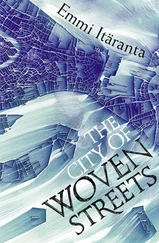I had asked Bolin to take care of the speech formalities. He welcomed the guests and spoke about my father briefly. Then he opened the leather-covered book he was holding, and read out a passage. I was aware of him speaking, but the words drifted away, their husks strange and hollow.
He closed the book, placed it carefully on the ground and nodded to Jukara. Together they lifted the coffin from the bench, carried it to the grave and slowly lowered it into the hole. As the closest family member I was the first to leave my greeting. This early in the year there were no flowers yet, and most trees had shed their leaves months ago, so I had picked an evergreen tea plant branch. I dropped it on the coffin, and in the shallow grave its dark brown and green dissolved into the bamboo. Only the smallest, brittlest buds shone as scattered stars against the dark background.
Most guests left a pebble or a mussel shell found in the long-dried riverbed as their last greeting. Their rapping was rain-soft on the bamboo lid. Bolin sprinkled silver-grey knots of tea leaves on the coffin.
When everyone had left their greetings, it was time for the water urn.
The lament-women began to sing.
It started as a quiet song that grew gradually, beautiful and ugly at once, like weeping forged into a waxing and waning melody that shrouded everything within its reach. Their language was old and strange. Its words sounded like a spell or curse, but I knew it was one of the past-world languages, now nearly lost, only remaining in the songs they and few others knew.
The lament spun a slow web around me, divided into countless threads that floated far away as glowing paths, through the fabric of things remembered and lost and forgotten. I lifted the water urn from the stone bench and walked to the edge of the grave where the tea plants stood. The song of the lament-women rose and fell, it grew leaves and branches and roots on my skin and under it, and my own outlines faded, because what I carried within couldn’t be contained in them: I was a forest that reached upwards and crumbled down again, I was the sky and the sea and the breath of the living and the sleep of the dead. Strange words carried me; a lost language directed my footsteps.
I bowed down to pour the water on the roots of the tea plants.
When the urn was empty, I carried it back to the stone bench. The song waned like wind.
The ceremony is over when there is no more water.
The guests began to move towards the house. I stood on the pale grass among bare trees for a long time, looking at the tea plants, and they did not grow slower or faster. Only when Sanja stopped next to me and placed her arm around my shoulders, did I feel my own outlines again and was no longer floating shattered in space.
‘They’re waiting for you,’ Sanja said.
‘I think he’d want me to stay a little longer,’ I said.
‘The dead don’t need pleasing, Noria,’ she said.
If anyone else had said it, or if she had said it in a different way, I would have walked into the fell there and then and left the guests in the house and not returned until they were all gone. But Sanja’s hand was solid on my shoulder, and I had never heard her voice so soft.
She turned to look me in the eye and swept a strand of hair from my face that I hadn’t noticed. I followed her into the house.
It was too dark in the living room, because I had entirely forgotten to think about light. The spring equinox was still over half a month away, and the day behind the windows was not bright. Relatives I may never have met before held short speeches. Ninia and Tamara took care of bringing food to the table. I had promised them two weeks’ water supply in exchange, and since all water pipes in the village had been closed, no one refused such offers. The lament-women ate and drank more than anyone else, but I didn’t blame them. Sanja sat next to me all the time.
I looked around, trying to remember where I knew everyone from. There was one guest I couldn’t place: a blond-haired man sitting in the corner wasn’t talking to anyone and didn’t seem to know anybody. I was fairly certain he wasn’t family, and nearly as certain that he wasn’t from the village. Yet there was something familiar about him.
‘Do you know him?’ I asked Sanja.
Sanja glanced at the man.
‘Never seen him in my life,’ she said.
He was in civilian clothing, but something about his gestures and the way he was watching the people in the room made me wonder if he was a soldier. Around the same time as weekly water patrols were made compulsory for everyone and the punishments for water crimes became harsher, soldiers had begun to appear in all large gatherings, either openly in their uniforms or disguised as civilians. I hadn’t believed these stories at first, but I had once mentioned them to my father who was too ill to go to the village any more, and he had said, ‘They’re watching closely now. They don’t want to risk organised resistance after the events of Moonfeast. They’re gripping us tight and will squeeze until no one has the courage to stand against them. It has begun, but it will not end any time soon.’
An unexpected shudder ran through me and anger weighed in my throat like hot stones, and then tears were pouring down my face. I let them. After a while they dried up, but I could still feel them charring and stinging behind my eyes. They would burn their way through again.
The guests trickled out little by little. When nearly everyone had left, Bolin came to me.
‘Could I speak to you for a while, Noria?’ he said. I noted that he used my first name instead of calling me Miss Kaitio as usual. He had known my father for a long time and helped with the funeral arrangements more than necessary. I thought he wanted to talk about his next tea visit.
‘I’ll see you the day after tomorrow,’ I told Sanja. ‘Thanks for coming.’ She squeezed my hand.
‘Send me a message or come and see us any time,’ she said. Jan nodded his goodbyes to me, and they left.
‘Could you bring the chest from the helicarriage?’ Bolin told his driver, who gave a small bow and walked outside, boots clanking on the floor planks. We were alone in the dusky living room, where only a couple of dim lamps separated light from shadow. Bolin had been coming to my father’s tea ceremonies since I was six or seven years old, and he had always treated me well and with respect even before I had any skill with the ceremony. He had been my father’s friend, as much as my father had any, and I trusted him well enough not to be afraid. I offered him a cup of tea, but he shook his head.
‘Noria,’ he began.
I waited. He seemed to be looking for the right words. A lone blazefly was whizzing softly against the window, and I wondered if I had left a lantern unclosed somewhere. I would need to sweep up dead blazeflies from the corners later.
Eventually Bolin spoke again.
‘There are people who believe there is water on your grounds,’ he said. ‘I don’t know if it’s true, but—’
‘It’s not true.’
‘I’m not here to fish for information,’ Bolin said, and his face was grave. ‘I don’t know if your father ever mentioned this, but we grew up together, and once upon a time I would have trusted him with my life. He didn’t understand why I chose an army career, but we salvaged what we could of our friendship. Therefore I know he would have wanted me to warn you.’ He went quiet for a moment. ‘The power is no longer in my hands. In name, perhaps, but every day, every hour it’s slipping to someone else, and soon there won’t be anything I can do for you. The power that used to be mine is Taro’s now. You must be as careful as you can, Noria.’
I wondered then how much exactly Bolin had been doing for my parents and me. I remembered my father saying that we had his protection. I began to understand I didn’t know what it really meant. Protection – from whom? The image of the blond-haired, unfamiliar funeral guest crossed my mind, the memories of the soldiers investigating the garden.
Читать дальше
Конец ознакомительного отрывка
Купить книгу












